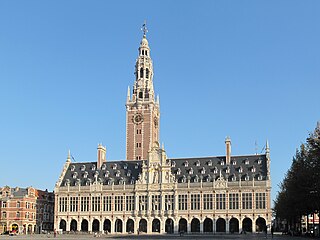
Leuven or Louvain is the capital and largest city of the province of Flemish Brabant in the Flemish Region of Belgium. It is located about 25 kilometres east of Brussels. The municipality itself comprises the historic city and the former neighbouring municipalities of Heverlee, Kessel-Lo, a part of Korbeek-Lo, Wilsele and Wijgmaal. It is the eighth largest city in Belgium, with more than 100,244 inhabitants.

The Catholic University of Leuven or Louvain was founded in 1834 in Mechelen as the Catholic University of Belgium, and moved its seat to the town of Leuven in 1835, changing its name to Catholic University of Leuven. In 1968, it was split into two universities, the Katholieke Universiteit Leuven and the Université catholique de Louvain, following tensions between the Dutch and French-speaking student bodies.

Catholic higher education includes universities, colleges, and other institutions of higher education privately run by the Catholic Church, typically by religious institutes. Those tied to the Holy See are specifically called pontifical universities.
The Katholieke Universiteit Brussel was a Flemish university located in Brussels, founded in 1969 as University Faculties St Aloysius (UFSAL), in many ways the equivalent of a liberal arts college. It split up from the primarily French-speaking Saint-Louis University, Brussels to become an independent Dutch-speaking institution. It became recognised as a university by the Flemish Community of Belgium in the early 1990s. It only ever awarded basic undergraduate degrees, which in the older Belgian system of a four-year licenciate meant students had to go on to other universities to complete their courses of study.

Arenberg Castle is a Flemish Renaissance style château in Heverlee, close to Leuven, Belgium. It is surrounded by a park.
The Katholieke Universiteit Leuven Associatie Kortrijk, or Kulak for short, is a university satellite campus of the KU Leuven in the city of Kortrijk (Courtrai) in the Belgian province of West Flanders and is therefore also officially a Dutch-speaking institution.

The American College of the Immaculate Conception, or the American College of Louvain is a former Roman Catholic seminary in Leuven, Belgium. Founded in 1857, it was operated by United States Conference of Catholic Bishops (USCCB) to prepare European priests for service in the United States and to provide a residence for Americans priests studying at the Catholic University of Louvain.
Science and technology in Flanders, being the Flemish Community and more specifically the northern region of Belgium (Europe), is well developed with the presence of several universities and research institutes. These are strongly spread over all Flemish cities, from Kortrijk and Bruges in the Western side, over Ghent as a major university center alongside Antwerp, Brussels and Leuven to Hasselt and Diepenbeek in the Eastern side.

The Evangelical Theological Institute is an interdenominational Evangelical Institute in Leuven, Flanders, Belgium and is recognised by the Federal Government of Belgium to award degrees and doctorates. It is an Evangelical institute which complements the Faculty of Theology and Religious Studies at the Catholic University Leuven. The ETF offers four degree programs: a Dutch-taught Bachelor of Arts in Theology and Religious Studies program, an English-taught Master of Arts in Theology and Religious Studies program, a Dutch-taught Teacher's degree program, and an English PhD program. Moreover, the ETF also offers a Bachelor's and Master's part-time program named ETF Open University.

Hogeschool-Universiteit Brussel was a Dutch language university founded in 2007. HUBrussel was the result of a merger between Brussels-based colleges European University College Brussels, Vlekho, HONIM and Catholic University of Brussels (KUBrussel).

The Leuven Faculty of Theology was a branch of the Catholic University of Leuven, founded in 1834 in Mechelen by the bishops of Belgium as the Catholic University of Belgium, that moved its seat to the town of Leuven in 1835, changing its name to Catholic University of Leuven.

Henri Maria Dymphna André Laurent "Rik" Torfs is a Belgian canon law scholar and media personality. He is a former Senator for the Christian Democratic and Flemish party in the Belgian Federal Parliament and a former Rector of the Catholic University of Leuven.

The city of Leuven in Belgium was the seat of three successive universities, each of which had a notable academic library.

KU Leuven is a Catholic research university in the city of Leuven, Belgium. In addition to its main campus in Leuven, it has satellite campuses in Kortrijk, Antwerp, Ghent, Bruges, Ostend, Geel, Diepenbeek, Aalst, Sint-Katelijne-Waver, and in Belgium's capital Brussels. KU Leuven is the largest university in Belgium and the Low Countries. In 2021–22, more than 65,000 students were enrolled, with 21% being international students. Its primary language of instruction is Dutch, although several programs are taught in English, particularly graduate and postgraduate degrees.

Pope's College or Pope Adrian VI College in Leuven was a college for theology students at the Old University of Leuven, founded by Pope Adrian VI in 1523. At the suppression of the old university in 1797 the college became public property. It is now a hall of residence of the Katholieke Universiteit Leuven, rented from the city council.

Marc Dessauvage (1931–1984) was a Belgian ecclesiastical architect, active primarily in the 1960s and 1970s. He broke with traditional church architecture to produce modernist buildings that were thought to give expression to the liturgical reforms of the time. In 1959 he won a Pro Arte Christiana design competition, drawing further praise from the Jesuit art theorist Geert Bekaert and the Benedictine liturgist Frédéric Debuyst, which launched him on a 20-year career. His growing deafness made communication with clients problematic. One of his most prestigious designs was for the Faculty of Arts of the Katholieke Universiteit Leuven (1971–72).
Jan Lambrecht was a Belgian Catholic priest of the Society of Jesus, Professor Emeritus of New Testament and Biblical Greek at the Faculty of Theology and Religious Studies, KU Leuven, Belgium and a member of the Pontifical Biblical Commission. As a theologian, biblical scholar, and prolific author, he contributed numerous studies on almost all the books of the New Testament, but focused especially on the Gospels and the Pauline letters. His publications included books and articles written in English, Dutch, and French.

The Louvain School of Engineering or École polytechnique de Louvain (EPL) is a faculty of the University of Louvain, Belgium, founded in 1864. Known as the Faculty of Applied Sciences prior to 2008, it currently operates on the campuses of Louvain-la-Neuve and UCLouvain Charleroi.















